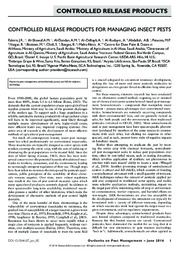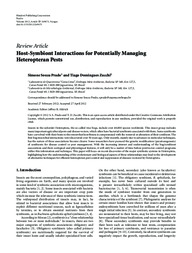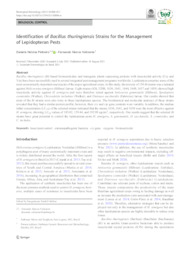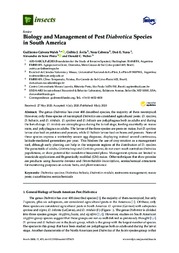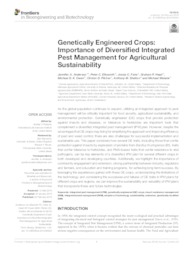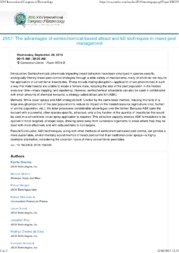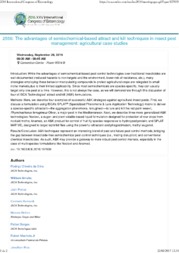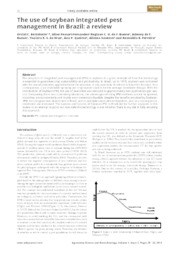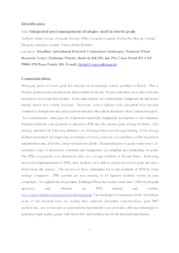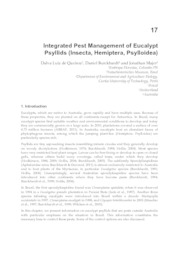Search Publications
Filter by:
| Author(s): FALEIRO, J. R.; AL-SHAWAF, A. M.; AL-DANDAN, A. M.; AL-ODHAYB, A.; AL-RUDAYNI, A.; ABDALLAH, A. B.; PEIXOTO, M. P.; VARGAS, R.; BOTTON, M.; CHIDI, S.; BORGES, R.; MAFRA-NETO, A. From 1900–2000, the global human population grew by more than 400%, from 1.5 to 6.1 billion (Roser, 2015). The demands that the current population places upon global food supplies presents what may be... ... |
| Author(s): PRADO, S. de S.; ZUCCHI, T. D. Insects in the suborder Heteroptera, the so-called true bugs, include over 40,000 species worldwide. This insect group includes many important agricultural pests and disease vectors, which often have... ... |
| Author(s): PINHEIRO, D. H.; VALICENTE, F. H. Bacillus thuringiensis (Bt)-based bioinsecticides and transgenic plants expressing proteins with insecticidal activity (Cry and Vip) have been successfully used in several integrated pest management p... ... |
| Author(s): CABRERA WALSH, G.; AVILA, C. J.; CABRERA, N.; NAVA, D. E.; PINTO, A. de S.; WEBER, D. C. The genus Diabrotica has over 400 described species, the majority of them neotropical. However, only three species of neotropical Diabrotica are considered agricultural pests: D. speciosa, D. balteata... ... |
| Author(s): ANDERSON, J. A.; ELLSWORTH, P. C.; FARIA, J. C.; HEAD, G. P.; OWEN, M. D. K.; PILCHER, C. D.; SHELTON, A. M.; MEISSLE, M. As the global population continues to expand, utilizing an integrated approach to pest management will be critically important for food security, agricultural sustainability, and environmental protect... ... |
| Author(s): SHARMA, K.; BOTTON, M.; BORGES, R.; MACHOTA JR, R.; SAROLI, J.; RICO, J.; SILVA, R. O. da; BERNARDI, C.; URRUTIA, W.; MAFRA, L. E. J.; MAFRA-NETO, A. Introduction: Semiochemicals (chemicals impacting insect behavior) have been employed in species-specific, ecologically friendly insect pest control strategies through a wide variety of mechanisms, ma... ... |
| Author(s): SILVA, R. O. DA; URRUTIA, W.; PONCE, J.; BERNARDI, C.; BOTTON, M.; BORGES, R.; MACHOTA JR, R.; RICO, J.; SAROLI, J.; SHARMA, K.; MAFRA, L. E. J.; MAFRA-NETO, A. Introduction: While the advantages of semiochemical-based pest control technologies over traditional insecticides are well-documented (reduced hazards to non-targets and the environment, lower risk of... ... |
| Author(s): BORTOLOTTO, O. C.; POMARI-FERNANDES, A.; BUENO, R. C. O. de F.; BUENO, A. de F.; KRUZ, Y. K. S. da; QUEIROZ, A. P.; SANZOVO, A.; FERREIRA, R. B. The adoption of integrated pest management (IPM) in soybean is a great example of how this technology is essential to guarantee crop sustainability and productivity. In Brazil, up to 1970, soybean was... ... |
| Author(s): LORINI, I.; FERREIRA FILHO, A.; LUNARDI, L.; MARCHI, F. de; ANTUNES, J. M.; BONATTO, L. T. D. Managing pests of stored grain has become an increasingly serious problem in Brazil. This is because grain production has more than doubled in the last 10 years and insect pests have become resistant... ... |
| |
Observation
Some of Embrapa's publications are published as ePub files. To read them, use or download one of the following free software options to your computer or mobile device. Android: Google Play Books; IOS: iBooks; Windows and Linux: Calibre.
Access other publications
Access the Agricultural Research Database (BDPA) to consult Embrapa's full library collection and records.
Visit Embrapa Bookstore to purchase books and other publications sold by Embrapa.

